When you’re caring for a ball python, one of the common concerns is how long they can go without eating. Surprisingly, these reptiles can last for several months, with some lasting up to two years under certain conditions. However, it’s important to recognize that factors like breeding cycles, environmental changes, and temperature levels can influence this fasting period. While adult ball pythons rely on their fat reserves, baby pythons don’t have the same luxury, making prolonged fasting more worrying for them. So, how do you ensure your python stays healthy during these fasting periods?
Key Takeaways
- Adult ball pythons can fast for several months, relying on their fat reserves.
- In the wild, ball pythons may fast for up to two years.
- Baby pythons typically should not last for longer than a month.
- Monitor weight, behavior, and condition during fasting to ensure health.
- Seek vet assistance if fasting is accompanied by significant weight loss or lethargy.
Understanding Ball Python Fasting
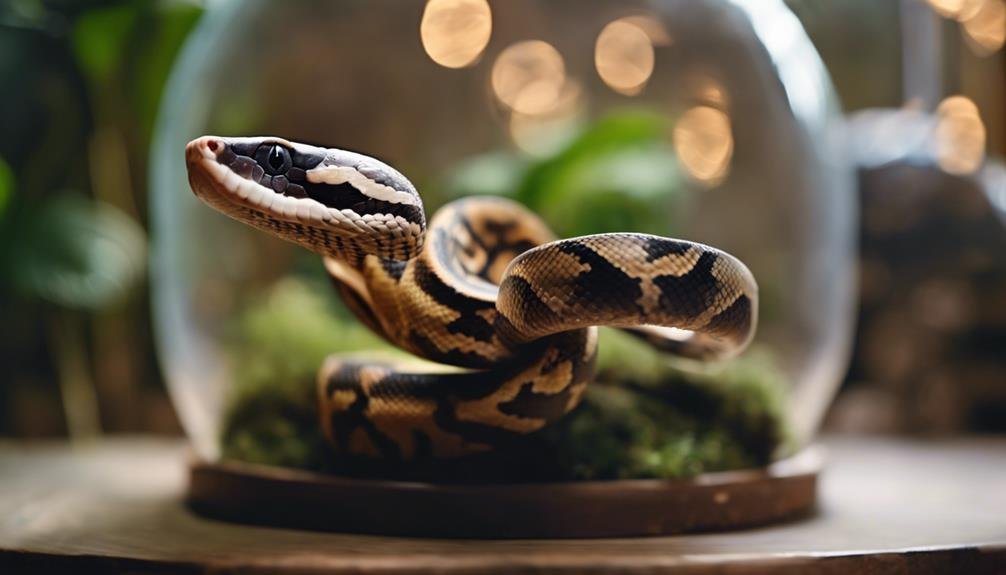

When your ball python decides to fast, it’s usually not a cause for immediate concern. Ball pythons, especially adults, often refuse food for extended periods. Healthy adult ball pythons can go without food for several months and sometimes up to a year. This natural behavior mirrors their wild counterparts, who experience lengthy periods without feeding due to seasonal changes and prey availability.
If your adult ball python refuses to eat, it’s important to recognize that occasional fasting is generally not harmful. These snakes have evolved to survive without frequent meals, relying on their fat reserves. Unlike young ball pythons, adults have sufficient fat stores to sustain them during these fasting periods.
Fasting is common among ball pythons and doesn’t always indicate a problem. However, monitoring your snake’s overall health and weight is essential. Make sure they remain active and exhibit normal behavior. Consulting a reptile veterinarian can provide peace of mind if you’re unsure or concerned.
Factors Influencing Fasting Duration
They understood why your ball python fasts can help you manage your health and well-being more effectively. Several factors influence the fasting duration of ball pythons, and recognizing these can alleviate concerns. Healthy adults can store substantial energy reserves, allowing them to survive without food for several months. They may even undergo a voluntary fast for up to a year, particularly during breeding seasons or when they encounter environmental changes.
The situation is different for baby ball pythons. They lack the significant fat reserves that adults possess, making them more vulnerable to shorter fasting periods. While it’s normal for baby ball pythons to fast for a week or two as they adapt to a new environment, prolonged fasting could indicate underlying issues that need attention.
Ball pythons face irregular prey availability in the wild, leading to naturally lengthy fasting periods. This adaptation helps them survive in unpredictable conditions. However, in captivity, you can manage your environment better to reduce stress and ensure regular feeding.
Natural Fasting Periods
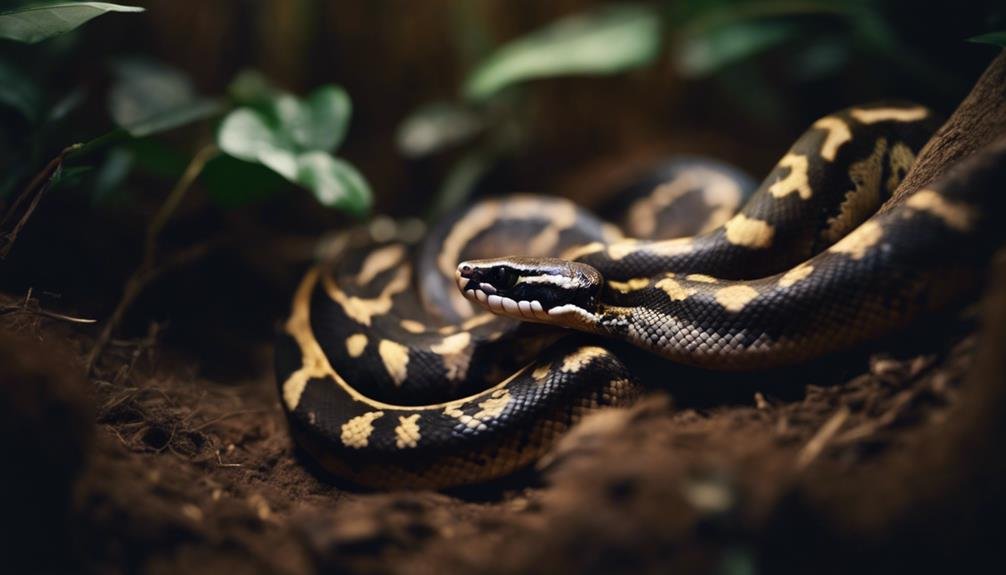

Ball pythons frequently experience extended fasting periods in their natural habitat due to irregular prey availability. These snakes can go up to two years without eating, thanks to their ability to efficiently manage their energy reserves. For adult ball pythons, surviving several months without food isn’t unusual, while young ones can likely survive at least a month without eating. Even baby ball pythons fasting for a week or two is considered normal.
When setting a feeding schedule for your ball python, remember that occasional fasts of about a month aren’t critical for healthy individuals. The type of prey items you offer, whether live or frozen prey, can also impact their feeding habits. Maintaining proper temperature and humidity levels in their enclosure is important, as these factors influence their metabolism and appetite.
Monitoring your snake’s body weight is essential during fasting periods. A healthy ball python can endure these natural fasting periods without significant weight loss. However, if you notice a drastic drop in body weight, it may be time to reassess your environment and feeding schedule.
Understanding these natural fasting periods helps you provide better care for your ball python.
Monitoring Health During Fasting
To guarantee your ball python stays healthy during fasting periods, closely monitor its body weight, behavior, and overall condition. Regular monitoring is essential because it helps you quickly spot any signs of illness that might arise during fasting.
Track your ball python’s weight weekly using a digital scale. A significant, rapid weight loss could indicate potential health problems. Observing behavior changes is equally important. If your ball python is lethargic, hides excessively, or shows unusual aggression, these could be red flags.
| Monitoring Aspect | What to Look For |
|---|---|
| Weight | Significant weight loss |
| Behavior | Lethargy |
| Behavior | Excessive hiding |
| Behavior | Unusual aggression |
| Overall Condition | Skin abnormalities |
During fasting, also keep an eye on the overall condition of your ball python. Look for any skin abnormalities, such as sores or unusual shedding patterns. If you detect any signs of illness, don’t hesitate to seek help from a reptile veterinarian.
Weight Loss Concerns
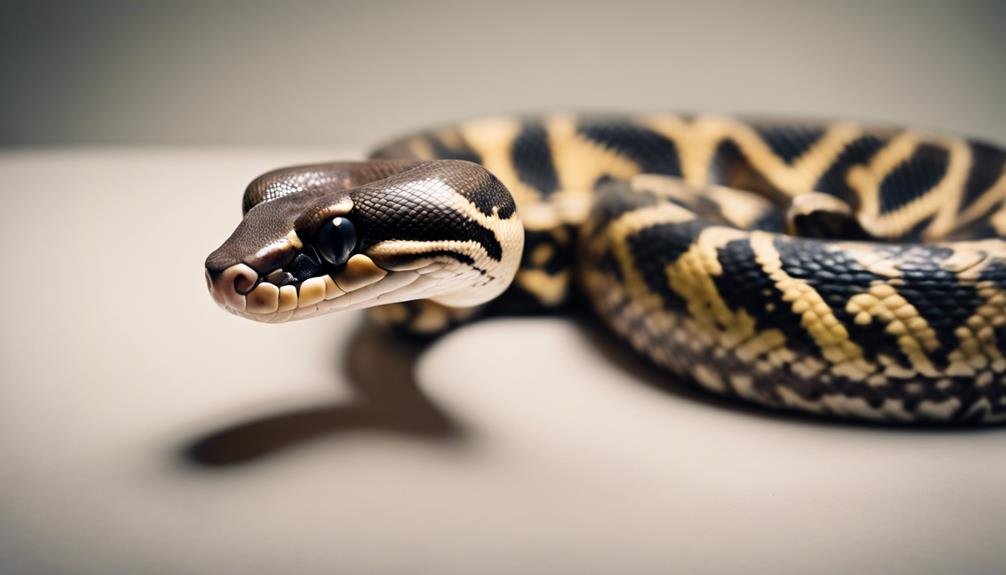

Sudden weight loss in your ball python can be a vital sign of underlying health issues that need immediate attention. It’s important to monitor their weight and overall body condition closely. Regularly monitoring these factors and any behavior changes can help you catch potential problems early.
If you notice your snake consistently losing weight, it’s time to consult a reptile vet. A professional can diagnose potential issues and offer tailored treatment options.
Feeding strikes, where your ball python refuses to eat for extended periods, can also lead to weight loss. While occasional feeding strikes are normal, prolonged ones aren’t and should be addressed promptly. Offering live prey under supervision might stimulate their feeding response, but always do this carefully to avoid injury to your snake.
Behavior changes, such as lethargy or unusual hiding, can indicate something’s wrong. If these signs accompany weight loss, seeking advice from a reptile vet is even more critical. Ignoring these symptoms can exacerbate the problem, making recovery more challenging.
Your proactive approach to monitoring and seeking timely veterinary care can make all the difference in your ball python’s health and well-being.
Signs of Malnutrition
Noticing signs of malnutrition early in your ball python can significantly affect their recovery and overall health. One of the most obvious signs is weight loss. If you notice your python’s body becoming thinner or its muscle mass decreasing, it clearly indicates something’s wrong.
Lethargy is another red flag. A malnourished ball python often exhibits reduced activity levels and may seem unusually sluggish or unresponsive.
Sunken eyes are also a telling sign. Healthy ball pythons have bright, alert eyes, but malnutrition can cause their eyes to appear sunken or dull.
Also, check for wrinkled skin, indicating dehydration and poor overall condition.
Another consequence of malnutrition is a weakened immune system. When your python isn’t getting the nutrients it needs, its body’s defenses are compromised, making it more susceptible to infections and illnesses.
It is important to regularly monitor your ball python’s body condition, behavior, and weight to catch these signs early.
Encouraging Your Python to Eat
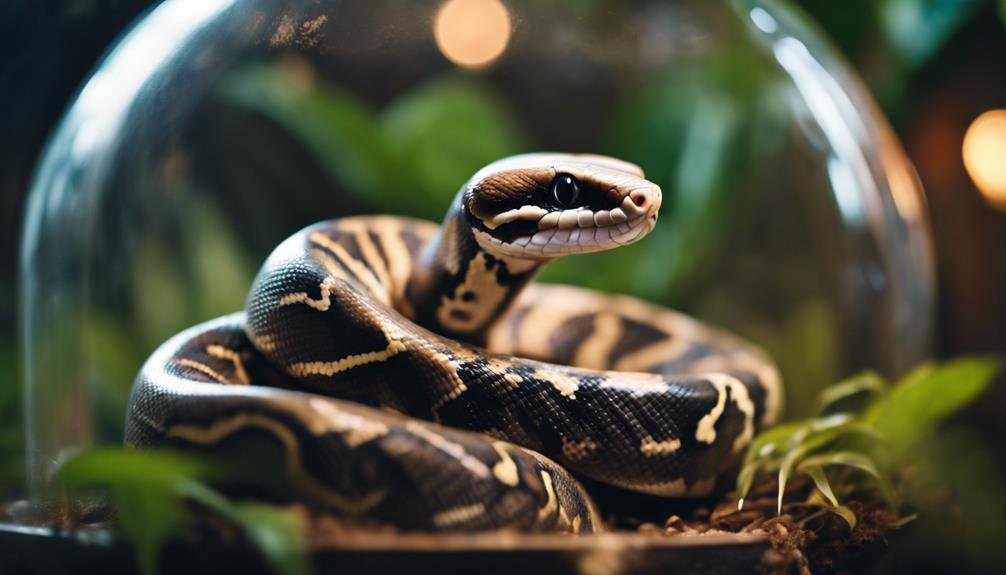

If your ball python isn’t eating, there are several strategies you can try to stimulate its appetite. First, contemplate the size of the prey. Sometimes, offering smaller or larger prey can make a difference. You might also try feeding your ball python during the evening or early morning when they are naturally more active. Consistent feeding times can help establish a routine, making your python more likely to eat every meal.
Another factor to contemplate is feeding frequency. While some pythons eat every week, others may prefer a longer interval. Adjusting the frequency can sometimes break a cycle of refusing food.
Here’s a table to help you troubleshoot:
| Issue | Possible Solution |
|---|---|
| Size of the prey | Try different prey sizes |
| Feeding frequency | Adjust intervals |
| Timing | Evening or early morning |
Stress and improper temperatures can also lead to feeding strikes. Contemplate maintaining appropriate heat and humidity levels in the enclosure. If your python is shedding or it’s breeding season, it might naturally refuse food, which is normal. However, consult a reptile vet to rule out any health issues if your ball python goes more than three months without eating.
Appropriate Prey Choices
Selecting the appropriate prey for your ball python is crucial for maintaining its health and well-being. Choose prey that matches its dietary needs and size to guarantee your snake stays healthy. The prey should be approximately the same width as your snake’s body to prevent feeding issues and ensure proper digestion.
Here are some key considerations:
- Prey Selection: Mice, rats, and chicks are ideal choices. These options provide the necessary nutrients and are readily available at pet stores.
- Appropriate Size: Always choose prey suitable for your ball python’s size. Prey that’s too large can cause regurgitation or feeding issues.
- Frozen Prey: It’s best to feed your snake-thawed, frozen prey. This practice reduces the risk of injuries and stress that live prey can cause.
- Calcium Supplement: Consider scenting the thawed prey with a calcium supplement. This can help ensure your ball python receives all essential nutrients, promoting strong bones and overall health.
Common Feeding Mistakes
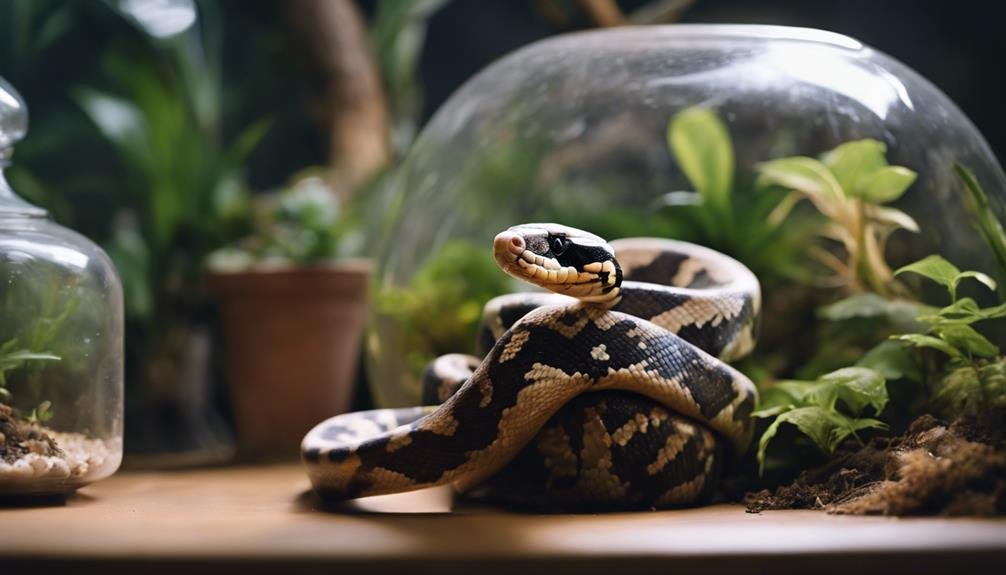

Feeding errors can greatly affect your ball python’s health and well-being. One common mistake is overfeeding, which can lead to obesity and various health issues. Ball pythons have slow metabolisms, so it’s important to avoid feeding them too frequently. Stick to a consistent feeding schedule matching their age and size to ensure they stay healthy.
Another frequent error is offering prey either too large or too small. Inadequate prey size can cause digestion problems and stress your snake. For the best digestion, choose prey items no wider than the broadest part of your python’s body.
Feeding live prey might seem natural, but it can harm your snake and increase their stress levels. A live rodent can bite or scratch your python, leading to injuries and infections. Opt for pre-killed or frozen-thawed prey to minimize these risks.
Stress also plays a significant role in feeding behavior. An inconsistent feeding schedule or a lack of a suitable hiding spot during feeding time can disrupt their eating habits. A secure hiding spot can reduce stress levels and encourage consistent feeding behavior.
When to Seek Veterinary Help
Recognizing when to seek veterinary help can make all the all-important difference in your ball python’s health. If your ball python has refused to eat for over three months, it’s time to seek veterinary attention. While a ball python can go without eating for extended periods, consistent eating refusal could signal underlying health issues. Here are key signs that warrant a visit to a reptile vet:
- Weight Loss: If your python is losing weight and refusing food, this red flag shouldn’t be ignored.
- Sudden Change in Eating Habits: A sudden or drastic change in appetite, especially if your snake is several years old, requires professional evaluation.
- Symptoms of Illness: Lethargy, unusual behavior, or visible signs of illness, coupled with not eating, indicate the need for immediate veterinary attention.
- Consistent Refusal to Eat: Consistent food refusal isn’t normal and should be checked even if your ball python can go without eating for a while.
Ensure you’re feeding your ball python appropriately, but consult a vet if these signs persist. Prompt action can secure your pet’s long-term health and well-being.
Conclusion
In conclusion, it’s important to understand your ball python’s fasting habits and monitor its health closely.
Adult ball pythons can fast for months, but babies need more frequent feedings. Keep an eye on weight loss and try different prey options if your python isn’t eating.
If you’re ever in doubt, don’t hesitate to consult a vet. Your attentiveness and care guarantee your python stays healthy and happy, even during fasting.


